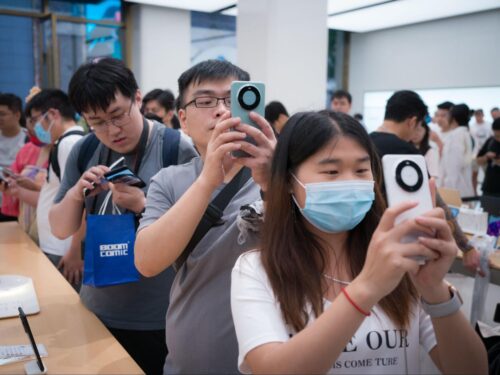Facebook, Huawei, ZTE — the drunken dance

American and Chinese tech industries and their regulators are like a bipolar couple doing a drunken dance where they alternately kiss and try to throttle each other. Today’s dysfunctional behavior includes the latest Facebook scandal:
Facebook signed agreements that “gave private access to some user data to Huawei, a telecommunications equipment company that has been flagged by American intelligence officials as a national security threat, as well as to Lenovo, Oppo and TCL,” reports the New York Times (paywall).
- The four deals are still in effect, but Facebook officials “said in an interview that the company would wind down the Huawei deal by the end of the week.”
- “Huawei said Wednesday it has never collected or stored Facebook user data,” according to the Associated Press.
An update on ZTE, from the front lines of the ever-impending trade war: The company has “signed an agreement in principle that would lift a U.S. Commerce Department ban on buying from U.S. suppliers, allowing China’s No. 2 telecommunications equipment maker to get back into business,” Reuters reports.
- ZTE would pay a $1 billion fine, “plus $400 million in escrow to cover any future violations.” The company was found in April to have conspired to avoid sanctions on Iran, endangering U.S. national security.
- The company has already “sent out reprimand letters to 35 current and former employees involved in illegal sales to Iran and is seeking to claw back bonuses from those who have left the company,” according to the South China Morning Post, which has previously reported that ZTE “sidelined at least three senior executives” in recent days in an effort to placate American worries.
- That isn’t working, at least not on Capitol Hill. Republican senator Marco Rubio sent out two tweets (1, 2) blasting the Department of Commerce for apparently treating the executive reshuffling as an acceptable compromise. Democratic senator Chuck Schumer, meanwhile, told Reuters, “The president who roared like a lion is governing like a lamb when it comes to China.”
In other U.S.-China trade war news related to technology:
- It’s a tech war, not a trade war: “This is not a trade conflict but rather a competition and comparison of technology,” Foxconn CEO Terry Gou said on Wednesday, AP reports. Also relevant to this point is a Marketplace report on “China’s quiet hunt to hire top U.S. researchers.”
- U.S. Treasury Secretary Steven Mnuchin favors legislation, rather than the executive action that Trump almost definitely prefers, to limit Chinese investment in sensitive American technologies, Bloomberg reports (paywall). Perhaps we will soon hear reports of another shouting match between Mnuchin and more hardline members of the administration.
- Fighting state subsidies with state subsidies: “American tech companies are starting to urge their government to take a leaf out of the Chinese book, and steer the industry over the long run,” also according to Bloomberg (paywall), primarily citing an editorial from Intel published last month that urged, “The U.S. needs a national strategy on artificial intelligence.”
News from other fronts on the trade war:
- China offered to buy “nearly $70 billion of U.S. farm, manufacturing and energy products” in exchange for the cancellation of major U.S. tariffs planned for later this month, the Wall Street Journal reports (paywall).
- U.S. officials are skeptical of the deal, which was proposed by Chinese economic envoy Liu He 刘鹤 to the American commerce secretary Wilbur Ross during his visit to Beijing over the weekend. The Journal says that “they argue that Chinese energy purchases would largely divert U.S. sales to other nations and have no overall impact on the U.S. trade deficit,” and that “they also aren’t sure that the U.S. could ramp up agriculture production that quickly.”






